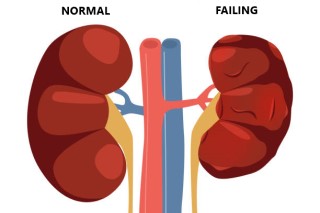Kidney Failure
Kidney Failure is a condition in which the kidneys can no longer adequately filter waste products from your body.
What is Kidney Failure?
Kidney failure, also known as End Stage Kidney Disease, is a condition in which your kidneys no longer work on their own well enough to keep you alive. Persons with kidney function of less than 15% of normal is considered to have kidney failure

Causes
Diabetes and high blood pressure are the most common causes of chronic kidney disease and kidney failure.
Diabetes can lead to high blood sugar levels (hyperglycemia). Consistently high blood sugar can damage your kidneys as well as other organs.
High Blood Pressure means blood travels forcefully through your body’s blood vessels. Over time and without treatment, the extra force can damage your kidneys’ tissue.
Diabetes can lead to high blood sugar levels (hyperglycemia). Consistently high blood sugar can damage your kidneys as well as other organs.
High Blood Pressure means blood travels forcefully through your body’s blood vessels. Over time and without treatment, the extra force can damage your kidneys’ tissue.
Symptoms
Early-stage kidney failure may show no symptoms. When the disease progresses some symptoms include:
• Loss of appetite
• Fatigue
• Edema- swelling of feet and ankle
• High blood pressure (hypertension)
• Need to urinate more often, especially at night
• Decreased mental sharpness
• Blood in urine
• Protein in urine
• Erectile dysfunction in men
• Twitching in the muscles and cramps
• Chest pain, if fluid builds up around the lining of the heart
• Shortness of breath is seen if fluid builds up in the lungs
• Loss of appetite
• Fatigue
• Edema- swelling of feet and ankle
• High blood pressure (hypertension)
• Need to urinate more often, especially at night
• Decreased mental sharpness
• Blood in urine
• Protein in urine
• Erectile dysfunction in men
• Twitching in the muscles and cramps
• Chest pain, if fluid builds up around the lining of the heart
• Shortness of breath is seen if fluid builds up in the lungs
Diagnosis
Diagnosis begins with a medical history and family history. Medical and blood chemical tests include:
• Levels of urea and creatinine is an indication of kidney function.
• Check urine for abnormalities such as the presence of blood or protein.
• Ultrasound or CT scans may be required to look for abnormalities in the kidney.
• A test to check kidney function called a Renal flow scan.
• Testing hormone levels (parathyroid hormone or PTH) which is affected by kidney function.
• Lastly a kidney biopsy may be required to examine a small tissue sample for further analysis.
• Levels of urea and creatinine is an indication of kidney function.
• Check urine for abnormalities such as the presence of blood or protein.
• Ultrasound or CT scans may be required to look for abnormalities in the kidney.
• A test to check kidney function called a Renal flow scan.
• Testing hormone levels (parathyroid hormone or PTH) which is affected by kidney function.
• Lastly a kidney biopsy may be required to examine a small tissue sample for further analysis.
Treatment
Depending on the cause, some types of kidney disease can be treated. Often, though, chronic kidney disease has no cure. Treatment usually consists of measures to help control signs and symptoms, reduce complications, and slow progression of the disease.
Some common treatments are:
• Nutrition and lifestyle changes for better kidney care.
• Medications to prevent further damage.
• Dialysis treatments to help clean the blood of toxins and wastes.
• Kidney transplantation for those whose kidneys are beyond treatment and have failed to function.
Some common treatments are:
• Nutrition and lifestyle changes for better kidney care.
• Medications to prevent further damage.
• Dialysis treatments to help clean the blood of toxins and wastes.
• Kidney transplantation for those whose kidneys are beyond treatment and have failed to function.
Office Hours
Monday
8:00 AM – 5:00 PM
Tuesday
8:00 AM – 5:00 PM
Wednesday
8:00 AM – 4:00 PM
Thursday
8:00 AM – 5:00 PM
Friday
8:00 AM – 3:30 PM
Saturday
Closed
Sunday
Closed
Lunch hour varies: 11:30AM-1:00PM
Make an Appointment
For all appointments and inquiries, please call (270) 843-5114.
720 East Second Avenue, Suite 203
Bowling Green, KY 42101
(270) 843-5114
720 East Second Avenue, Suite 203
Bowling Green, KY 42101
(270) 843-5114
